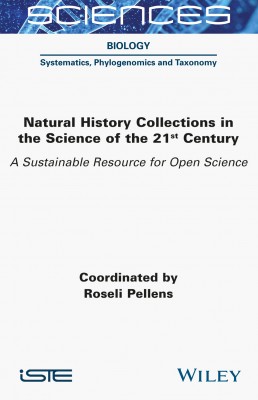
Natural history collections have recently acquired an unprecedented place of importance in scientific research. Originally created in the context of systematics and taxonomy, they are now proving to be fundamental for answering various scientific and societal questions that are as significant as they are current.
Natural History Collections in the Science of the 21st Century presents a wide range of questions and answers raised by the study of collections. The billions of specimens that have been collected from all around the world over more than two centuries provide us with information that is vital in our quest for knowledge about the Earth, the universe, the diversity of life and the history of humankind.
These collections also provide valuable reference points from the past to help us understand the nature and dynamics of global change today. Their physical permanence is the best guarantee we have of a return to data and to information sources in the context of open science.
1. Natural History Collections: An Essential Resource for Science in the 21st Century, Roseli Pellens.
2. Natural History Collections: An Ancient Concept in a Present and Future Perspective, Philippe Grandcolas.
3. Louis XIV’s Blue Gems: Exceptional Rediscoveries at the French National Museum of Natural History, François Farges.
4. Rediscovering Human Mummies: Unpublished data on the Chachapoya Mummy Exhibited at the Musée de l’Homme, Aline Thomas, Arnaud Ansart, Christophe Bou, Jean-Bernard Huchet, Véronique Laborde, Samuel Merigeaud and Éloïse Quetel.
5. Reconstructing the History of Human Populations: A Challenge for Biological Anthropology, Martin Friess and Manon Galland.
6. The Discovery of New Metal-Hyperaccumulating Plant Species in Herbaria, Vanessa R. Invernon, Romane Tisserand, Pierre Jouannais, Dulce M. Navarette Gutierrez, Serge Muller, Yohan Pillon, Guillaume Echevarria and Sylvain Merlot.
7. Fossil Crustaceans in the Light of New Technologies, Sylvain Charbonnier and Marie-Béatrice Forel.
8. The “Cyanobacteria and Microalgae” Collection in the Time of “-omics”, Sébastien Duperron, Charlotte Duval, Sahima Hamlaoui, Katia Comte, Claude Yéprémian and Cécile Bernard.
9. The Collection of Cryopreserved Cells and Tissues of Vertebrates: Methods and Application, Michèle Gerbault-Seureau and Bernard Dutrillaux.
10. Herbaria, the Last Resort for Extinct Plant Species, Serge Muller, Valérie Priolet, Éric Badel and Stéphane Buord.
11. Ocean Cores, Climate Archives, Eva Moreno and Annachiara Bartolini.
12. Clarifying the Radiocarbon Calibration Curve for Ancient Egypt: The Wager of Herbaria, Anita Quiles, Vanessa R. Invernón, Lucile Beck, Emmanuelle Delque Kolic, Myriam Gaudeul, Serge Muller and Germinal Rouhan.
13. Herbaria, a Window into the Evolutionary History of Crop Pathogens, Lionel Gagnevin, Adrien Rieux, Jean-Michel Lett, Philippe Roumagnac, Boris Szurek, Paola Campos, Claudia Baider, Myriam Gaudeul and Nathalie Becker.
14. The Yellow-Legged Asian Hornet: Prediction of the Risk of Invasion and the Study of its Color Variations, Claire Villemant, Quentin Rome and Adrien Perrard.
15. Exploring Temporal Changes in the Composition of Macroalgal Communities by Using Collections, Marine Robuchon, Éric Feunteun, Romain Julliard, Florence Rousseau and Line Le Gall.
16. Herbaria, Witnesses of the Stakes of Biodiversity Conservation and the Impacts of Global Changes, Conservation and the Impacts of Global Changes, Serge Muller, Vanessa R. Invernón and Germinal Rouhan.
17. Digital Photography In Natura in Zoology: More Biology in Natural History Collections?, Romain Garrouste.
18. The Use of Large Natural History Datasets to Respond to Current Scientific and Societal Issues, Anne-Christine Monnet, Thomas Haevermans, Anne Sophie Archambeau, Philippe Grandcolas and Roseli Pellens.
19. Is There a Need for Biocultural Collections? State of the Art and Perspectives, Serge Bahuchet.
20. Why Preserve?, Véronique Rouchon.
21. Collections for Scientific Research in the 21st Century and Beyond, Roseli Pellens.
Roseli Pellens is a researcher in macroecology and systematics for conservation at the Institute of Systematics, Evolution and Biodiversity, France. Her research interests include openness and sharing in science, and the contribution of natural history collections as a sustainable source of data and inspiration.